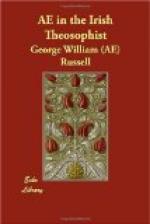Little heaps of paper activities piled themselves up, were added to, diminished, and added to again, all the day long before Harvey at his desk. He had returned to his work: there was an unusual press of business, and night after night he was detained long beyond the usual hours. The iron hand which he had foreseen was laid upon him: it robbed him even of his right to sorrow, the time to grieve. But within him at moments stirred memories of the past, poignant anguish and fierce rebellion. With him everything transformed itself finally into ideal images and aspects, and it was not so much the memory of an incident which stung him as the elemental sense of pain in life itself. He felt that he was debarred from a heritage of spiritual life which he could not define even to himself. The rare rays of light that slanted through the dusty air of the office, mystic gold fallen through inconceivable distances from the pure primeval places, wakened in him an unutterable longing: he felt a choking in his throat as he looked. Often, at night, too, lifting his tired eyes from the pages flaring beneath the bright gas jet, he could see the blueness deepen rich with its ancient clouds of starry dust. What pain it was to him, immemorial quiet, passivity and peace, though over it a million tremors fled and chased each other throughout the shadowy night! What pain it was to let the eyes fall low and see about him the pale and feverish faces looking ghostly through the hot, fetid, animal, and flickering air!
His work over, out into the night he would drag himself wearily— out into the night anywhere; but there no more than within could he escape from that power which haunted him with mighty memories, the scourge which the Infinite wields. Nature has no refuge for those in whom the fire of spirit has been kindled: earth has no glory for which it does not know a greater glory. As Harvey passed down the long streets, twinkling with their myriad lights fading into blue and misty distances, there rose up before him in the visionary air solemn rows of sphinxes in serried array, and starlit pyramids and temples—greatness long dead, a dream that mocked the lives around him, hoarding the sad small generations of humanity dwindling away from beauty. Gone was the pure and pale splendour of the primeval skies and the lustre of the first-born of stars. But even this memory, which linked him in imagination to the ideal past, was not always his: he was weighted, like all his race, with an animal consciousness which cried out fiercely for its proper life, which thirsted for sensation, and was full of lust and anger. The darkness was not only about him, but in him, and struggled there for mastery. It threw up forms of meanness and horrible temptations which clouded over his soul; their promise was forgetfulness; they seemed to say: “Satisfy us, and your infinite longing shall die away: to be of clay is very dull and comfortable; it is the common lot.”




